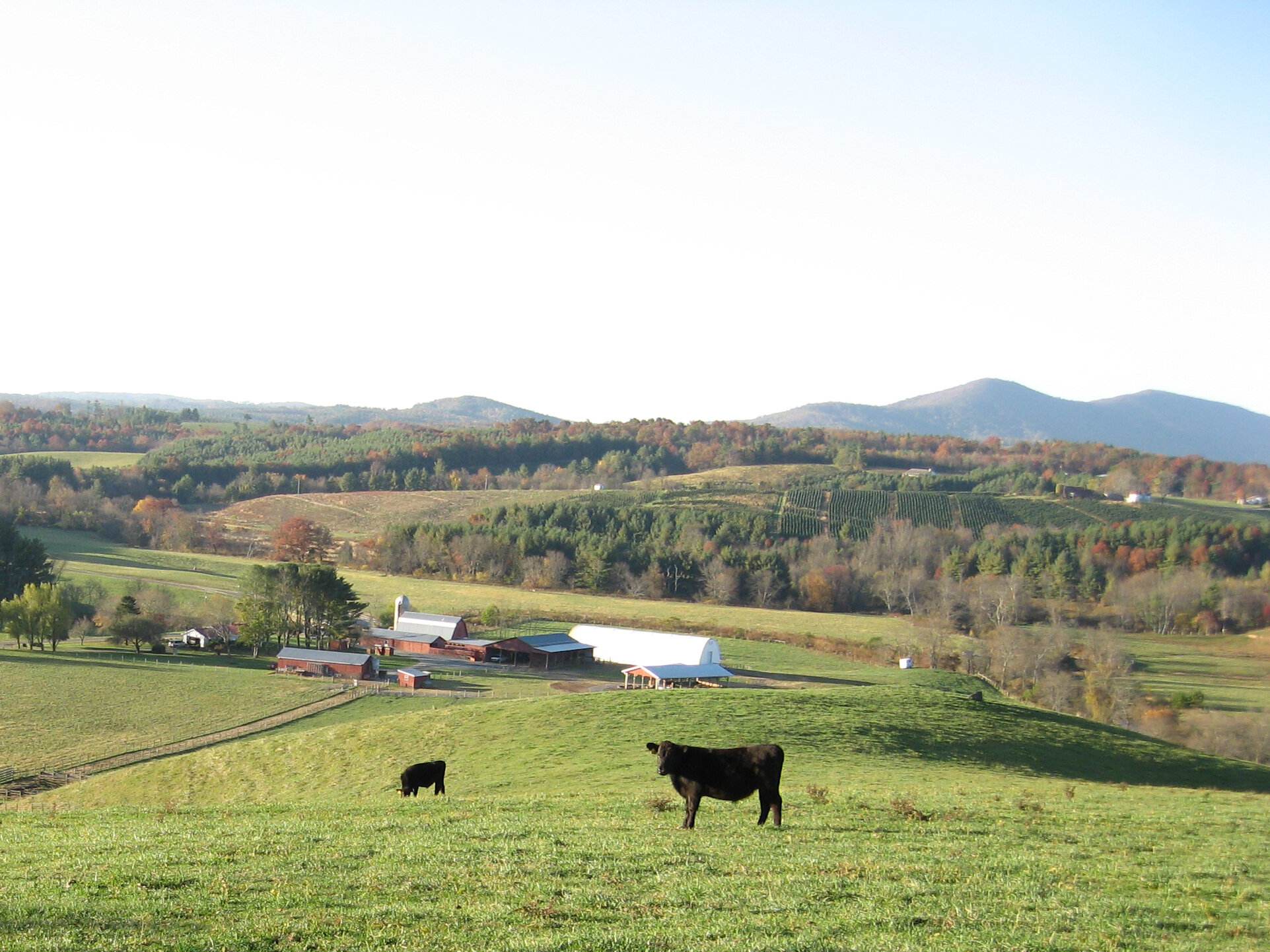Resources for Conservation Easement Landowners
What is a Conservation Easement? A conservation easement is a legal agreement between a landowner and a land trust or government agency that permanently limits uses of the land in order to protect its conservation values. It allows you to continue to own and use your land and to sell it or pass it on to heirs. Conservation easements run with the land, therefore future landowners need to abide by the restrictions as well.
Reserved Rights: You may have reserved rights in your easement document that allow certain types of development or activities on your protected property. Some reserved rights may be permitted only once, while others are perpetual. Certain activities are restricted to a portion of the easement area, while others are unrestricted as to location. In most cases, prior consent by Blue Ridge Conservancy is required before the commencement of any construction or the execution of other reserved rights. When prior consent is required, it is very important that you notify Blue Ridge Conservancy and submit plans in advance. If a planned activity is in compliance with the conservation easement, Blue Ridge Conservancy will send written approval. If it is not in compliance, you will be asked to submit alternate plans. A record of all exercised reserved rights is kept in our permanent files.
You are responsible for being aware of and complying with all laws on your property. If the law requires permits or notification of any government agencies before undertaking an activity, you must complete those steps before going forward. Blue Ridge Conservancy is responsible only for evaluating your plans with regard to the conservation easement. Likewise, when government officials evaluate your plans, they will not consider whether your plans meet the terms of the conservation easement. We are committed to working with you in a timely manner to ensure any proposed activity is appropriate. We have included a list of management resources at the end of this manual, and Blue Ridge Conservancy staff is always available to answer questions or recommend professionals we have worked with in the past.
Annual Monitoring: Periodic monitoring is crucial to the continued security of the conservation values protected by easements and is necessary to fulfill IRS and Land Trust Alliance requirements. Monitoring establishes a record of responsible stewardship and detects issues early. It also ensures Blue Ridge Conservancy and the landowner maintain a good working relationship. Easement monitoring involves an annual visit from Blue Ridge Conservancy staff or volunteer to inspect the easement area and document any changes. You are always welcome to accompany us during a monitoring visit. Blue Ridge Conservancy will notify you prior to monitoring your property.
Changes in Ownership: As with any property, land subject to a conservation easement changes hands over time. In order to ensure perpetual protection of our conservation easements, we ask that you notify all potential buyers and leasers about the easement on your property. We are available to speak to prospective buyers regarding the terms of the easement. We also ask that you notify Blue Ridge Conservancy if you sell your property or if you transfer ownership to another party.
It is very important that prospective landowners of property protected by conservation easements understand the significance of the easement: what it means, its restrictions, as well as Blue Ridge Conservancy’s monitoring protocol. It is imperative that we are notified of new landowners so we can contact them, introduce our organization, and ensure the conservation easement is understood. In addition, we will explain our stewardship program and answer any questions the new owners may have. Establishing contact immediately with the new landowners helps us to minimize misunderstandings and prevent violations of easement terms.
Contacts for Landowners
Blue Ridge Conservancy encourages landowners to be good stewards of their easement property. Below are resources for land management issues relating to erosion control, farm management and sound timber management. Before implementing any land management activities consult your easement and contact Blue Ridge Conservancy.
Natural Resource Conservation Service
NRCS puts over 70 years of experience to work in assisting owners of America's private land with conserving their soil, water, and other natural resources. Cost shares and financial incentives are available in some cases. Every county in North Carolina is served by a Soil and Water Conservation District and NRCS office.
Alleghany County Ashe County Avery County Watauga County
90 S Main St. 134 Government Circe 146 West B Street, Unit 3 971 West King St
Sparta, NC 28675 Jefferson, NC 28640 Newland, NC 28657 Boone, NC 28607
336-372-4645 336-246-8875 828-733-2291 828-264-3850
Yancey County Mitchell County Wilkes County
22 Hwy 19 E By-Pass, Suite 1 11943 S Hwy 226 207 W Main St.
Burnsville, NC 28714 Spruce Pine, NC 28777 Wilkesboro, NC 28697
828-682-2466 828-765-5049 336-838-3622
North Carolina Cooperative Extension
NC Cooperative Extension gives residents easy access to resources and expertise of NC State University and NC A&T State University through educational programs, publications and events. Agents deliver unbiased, research-based information on economic prosperity, environmental stewardship and improved quality of life.
Ashe County Alleghany County Watauga County
134 Government Circle, Suite 202 90 South Main St 971 W. King Street
Jefferson, NC 28640 Sparta, NC 28675 Boone, NC 28607
336-846-5850 336-372-5597 828-264-3061
Avery County Mitchell County Wilkes County
805 Cranberry Street 10 S. Mitchell St 201 Curtis Bridge Rd. Suite A
Newland, NC 28657 Bakersville, NC 28705 Wilkesboro, NC 28697
828- 733-8270 828-688-4811 336-651-7331
Yancey County
10 Orchard Dr.
Burnsville, NC 28714
828-682-6186
Soil & Water Conservation District Offices
NC Division of Soil and Water Conservation cooperates with federal agencies and local partners to administer a comprehensive statewide program to protect and conserve the state's soil and water resources. The Division delivers programs in non-point source pollution management, cost share for agricultural best management practices, technical and engineering assistance, soil surveys, conservation easements, and environmental and conservation education.
Alleghany County Ashe County/New River Avery County
90 South Main St, Room 200 134 Government Circle, Suite 102 PO Box 190/146 West B Street
Sparta, NC 28675 Jefferson, NC 28640 Newland, NC 28657
336-372-4645 336-846-5258 828-733-2291
Mitchell County Watauga County Wilkes County
11943 South Highway 226 971 West King Street 207 West Main Street, Room 244
Spruce Pine NC 28777 Boone, NC28607 Wilkesboro, NC 28697
828-765-4701 x 3 828-264-0842 336-838-3622 x 3
Yancey County
22 East Bypass, Suite 1
Burnsville, NC 28714
828-682-2466
North Carolina Forest Service
NC Forest Service is directly involved with forest management assistance to private landowners, reforestation services, forest fire prevention and suppression, and insect and disease control programs.
Alleghany County Ashe County Avery County
PO Box 163 629 Ashe Central School Rd 242 Prison Camp Road
Sparta, NC 28675 Jefferson, NC 28640 Newland, NC 28657
336-372-8142 336-982-2471 828-766-8043
Mitchell County Watauga County Wilkes County
125 Forest Service Rd 655 Landfill Road 638 New Browns Ford Rd
Bakersville, NC 28705 Boone, NC 28607 Wilkesboro, NC 28697
828-688-9405 828-265-5375 336-973-4104
Yancey County
PO Box 1288
Burnsville, NC 28714
828-682-6788
Resource Conservation & Development Program
Blue Ridge RC&D Council is designed to address needs and opportunities in the area of water management, land management, community development, and land conservation.
Blue Ridge RC&D
11943 South 226 Hwy, Suite C
Spruce Pine, NC28777
828-765-4701 ext 5
North Carolina Natural Heritage Program
The program serves as an information clearinghouse in support of conservation of the rarest and most outstanding elements of natural diversity in the state. These elements of natural diversity include plants and animals which are so rare or the natural communities which are so significant that they merit special consideration as land-use decisions are made. Natural Heritage Program inventories, catalogues, and supports conservation of the rarest and the most outstanding elements of the natural diversity of our state.
Natural Heritage Program
1601 Mail Service Center
Raleigh, NC 27699-1601
877-623-6748
Wildlife Resources Commission
The North Carolina Wildlife Resources Commission is the state government agency created by the General Assembly in 1947 to conserve and sustain the state’s fish and wildlife resources through research, scientific management, wise use, and public input. The Commission is the regulatory agency responsible for the enforcement of N.C. fishing, hunting, trapping and boating laws.
Wildlife Resource Commission
1751 Varsity Dr.
Raleigh, NC 27606
919-707-0010
Blue Ridge Women in Agriculture
Blue Ridge Women in Agriculture (BRWIA) is dedicated to strengthening the High Country's local food system by supporting women and their families with resources, education, and skills related to sustainable food and agriculture. BRWIA does this by providing peer-to-peer education for farmers, expanding markets for producers, and increasing opportunities for everyone to have access to fresh local food. For farmer and landowner educational programming, BRWIA organizes Blue Ridge CRAFT (Collaborative Regional Alliance for Farmer Training), www.craft.brwia.org.
For producer market opportunities, BRWIA manages the High Country Food Hub, www.foodhub.brwia.org, and Boone's Winter Farmers' Market and the King Street Farmers' Market, farmersmarkets.brwia.org.









